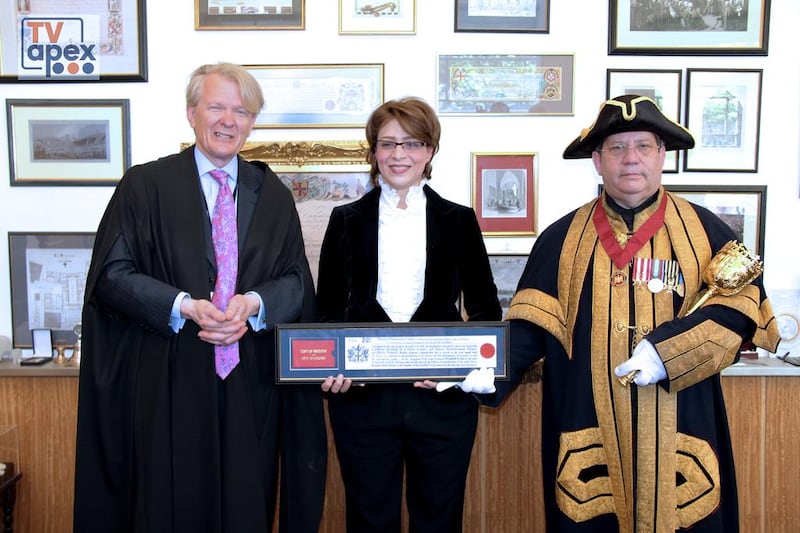Getting freedom of a city is not something you can expect from a young country like the UAE but several residents – and even one national – do hold Freedom of the City of London, probably one of the most famous “freedoms” in the world.
At least half a million people have been granted this honour since the tradition began in 1237, the century of the Magna Carta. And this year, two UAE-based residents – business coach and author Nigel Cumberland and Yemeni scientist Manahel Thabet – are among those granted this honour.
The Freedom of the City is an honour a city or district bestows on members of the community or visiting celebrities or dignitaries. The tradition continues in the UK, Ireland, Australia, Canada, South Africa and New Zealand. In the US, recipients may receive a Key to the City – the Kardashian-Jenner clan, for instance, have received keys to Los Angeles’ Beverly Hills 90210.
In England, the most famous “freedom” is accorded by the City of London, the traditional Square Mile district and city that has remained one of the world’s biggest financial centres. Famous recipients are Nelson Mandela, Diana, Princess of Wales, the actor Michael Caine, Harry Potter author J K Rowling, Homeland star Damien Lewis and Bill Gates.
Beneficiaries become a freeman or freewoman (previously known as free sister). In what must have been the running gag of the 2014 ceremony, actor Morgan Freeman is indeed now a freeman.
“I am the first UAE resident to only be given freedom without it being part of joining one of London’s ancient guilds,” says Mr Cumberland, the British author of 100 Things Successful People Do. “When one joins a guild, one is automatically able to become a freeman. In my case, I was put forward by my pro poser and seconder, both of whom are long-serving members of livery companies and guilds in the City of London, for having helped British businesses all over the world during my 25 years of expatriate life, as well as for my work as an author.”
Mr Cumberland, 49, has been in Dubai for five years and is a founder of the Silk Road Partnership coaching and training consultancy. He says the process is easy but takes time.
A year ago, he had to travel in person to the City of London to submit paperwork, including his birth certificate. His application was approved in September at the Court of Common Council’s annual meeting and Mr Cumberland was enrolled in a ceremony in June at the Chamberlain’s Court Room in London’s Guildhall.
Sadly, there are no lavish robes involved – just smart appearance – and few costs, although a donation to the charitable causes of the City of London is requested. The candidate reads aloud the declaration of a freeman, to “keep this City harmless” and “keep the Queen’s peace”, and signs the register. The Chamberlain extends the right hand of fellowship to the recipient and greets them as a citizen of London. A sealed certificate is supplied, along with a parchment copy of the freedom and of the rules for conducting a freeman’s honourable life.
Ms Thabet, 33, a resident of Dubai for the past 16 years and founder of Smart Tips business development consultancy, is used to receiving honours. She has three PhDs.
“Nobody can apply for the freedom of the City of London,” she says. “One must be invited by existing holders. Anybody who has to ask will probably not get it.”
Murray Craig, clerk of the Chamberlain’s Court, says that, in all, five residents of Dubai have been admitted to the freedom and one citizen of the UAE. “All of them received the freedom as part of the process of becoming a liveryman of one of the London Livery Companies,,” he says.
There are a number of now-redundant rights a freeman could enjoy: exemption from tolls and a vote in the City’s governance; to drive sheep and cattle over London Bridge; to choose a silken rope if unfortunate enough to be hanged; and to be sent home in a taxi, rather than jailed by the City of London police, if found inebriated and incapable. Freemen’s children also get admission preference at the City of London Freemen’s School.
So what tangible benefits does this distinction provide? “My publisher, Hodder and Stoughton, is very happy with me becoming a freeman as it adds to my prestige,” Mr Cumberland says. “I am also a freemason. Becoming a freeman, like being a freemason, helps open doors through networking.”
“It represents a unique slice of London history,” says Mr Craig. “Today, it is purely symbolic but in the past it was a very valuable working document.”
Ms Thabet says: “In the medieval period, freedom entitled freemen to trade within the City of London – essentially a passport to great wealth. In modern times it entitles freemen to mutual respect, recognition and support among an elite body of individuals.
“Becoming a freeman is to join an exclusive club of renowned individuals whose trustworthiness, honesty, morality and overall human qualities are expressed in our allegiance to Her Majesty the Queen.”
business@thenational.ae
Follow The National's Business section on Twitter





